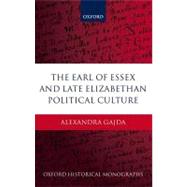The Earl of Essex and Late Elizabethan Political Culture
, by Gajda, Alexandra- ISBN: 9780199699681 | 0199699682
- Cover: Hardcover
- Copyright: 5/4/2012
In sixteenth-century England Robert Devereux, 2nd earl of Essex, enjoyed great domestic and international renown as a favourite of Elizabeth I. He was a soldier and a statesman of exceptionally powerful ambition. After his disastrous uprising in 1601 Essex fell from the heights of fame and favour, and ended his life as a traitor on the scaffold. This interdisciplinary account of the political culture of late Elizabethan England explores the ideological contexts of Essex'sextraordinary career and fall from grace, and the intricate relationship between thought and action in Elizabethan England. By the late sixteenth century, fundamental political models and vocabularies that were employed to legitimise the Elizabethan polity were undermined by the strains of war, the ambivalence that many felt towards the church, continued uncertainty over the succession, and the perceived weaknesses of the rule of the aging Elizabeth. Essex's career and revolt threw all of these strains into relief. Alexandra Gajda examines the attitude of the earl and his followers to war, religion, the structuresof the Elizabethan polity, and Essex's role within it. She also explores the classical and historical scholarship prized by Essex and his associates that gave shape and meaning to the earl's increasingly fractured relationship with the Queen and regime. She addresses contemporary responses to theearl, both positive and negative, and the earl's wider impact on political culture. Political and religious ideas in late sixteenth-century England had an important impact on political events in early modern England, and played a vital role in shaping the rise and fall of Essex's career.






